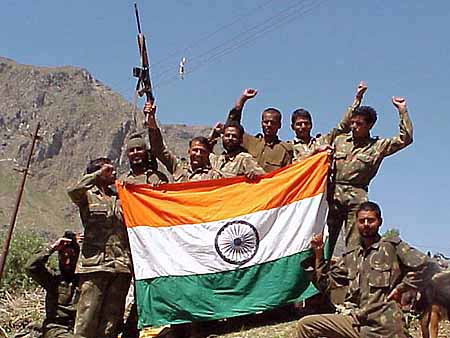
Washington, September 21: Kargil conflict was a "poor test" of India's air warfare capability, a prominent US think-tank has said, warning that with threats of future wars with Pakistan and China persisting, Indian defence establishment has to prepare accordingly.
"Despite the happy ending of the Kargil experience for India, the IAF’s fighter pilots were restricted in their operations due to myriad challenges specific to this campaign.
They were thus consigned to do what they could rather than what they might have done if they had more room for maneuver," said the think-tank in a report released yesterday.
The Kargil war, in which India emerged victorious over Pakistan, the 70-page report titles "Airpower At 18,000': the Indian Air Force in the Kargil War' further brought to light the initial near-total lack of transparency and open communication between Indian Army's top leaders and the IAF.
The report by the Carnegie Endowment for International Peace said the covert Pakistani intrusion into Jammu and Kashmir had exposed a gaping hole in India's nationwide real-time intelligence.
"On a strategic level, the Kargil War vividly demonstrated that a stable bilateral nuclear deterrence relationship can markedly inhibit such regional conflicts in intensity and scale—if not preclude them altogether," it said.
"In the absence of the nuclear stabilizing factor, those flash points could erupt into open-ended conventional showdowns for the highest stakes. But the Kargil War also demonstrated that nuclear deterrence is not a panacea," the report said.
It said the possibility of future conventional wars of major consequence along India's borders with Pakistan and China persists, and the Indian defence establishment must plan and prepare accordingly.
According to the report, Pakistan's military leaders miscalculated badly in their apparent belief that the international community would press immediately for a cease-fire in Kashmir out of concern over a possible escalation of the fighting to the nuclear level, with the net result that Pakistan would be left with an easily acquired new slice of the terrain on the Indian side of the LoC.
Carnegie said the nuclear balance between the two countries did not deter a determined Indian conventional response, and the successful reaction that India ultimately mounted on the Kargil heights fell well short of being all out in scale.
"Furthermore, since the Vajpayee government scrupulously kept its combat operations confined to Indian-controlled Kashmir, the international community had no compelling reason to intervene," it said.
As a result, a remote but high-intensity and high-stakes showdown was allowed to run on for more than two months, something the Pakistan Army’s leaders all but certainly did not anticipate when they first conjured up their incursion plan.
The Kargil experience also suggested that if China and Pakistan came to appreciate that India possessed overwhelming conventional force preponderance in the region, that presence could act as a deterrent against such provocations in the future, it said.
According to the report, prudent Indian defence planners will likely find themselves shortchanged in their preparations for the full spectrum of possible challenges to their country’s security in years to come if they draw undue comfort from the happy ending of the Kargil experience and accept that conflict as their only planning baseline for hedging against future contingencies along the Line of Control.






Comments
Add new comment